One of the most frequent questions I get from teachers is about appropriation. From what I know of my own practice, I think a lot of confusion arises because non-Indigenous peoples may not be aware of elements of Indigenous cultures that are sacred and part of spiritual practice, or understand that they are asking students to recreate ancient art forms that are passed through apprenticeship relationships.
Furthermore, sometimes Indigenous spirituality is downplayed and treated differently than we would treat other religious or spiritual traditions in the classroom.
Example: Sharing traditional stories with students from books or recorded sources and then asking students to write their own.
Ask yourself: Would I find it appropriate asking students to write a story from the Bible after studying it?
Example: Having students choose spirit names or clans while teaching about Indigenous communities.
Ask yourself: Would I ask my students to take on names or identities of other communities that I am teaching about? How can I respect the sacred elements of culture?
Last month, I had the opportunity to hear Dr. Jennifer Wemigwans, who is Anishnaabekwe (Ojibwe/Potawatomi) from Wikwemikong First Nation, speak on the question of appropriation in teaching. Dr. Wemigwans advised us to "be explicit with our students about where we locate cultural knowledge by referencing and citing both the person or source it comes from and the Nation from which it originates."
When creating follow up activities, the question I ask myself is; would I teach this lesson about any other community, group, spiritual or religious tradition? I also consult some trusted sources. You may want to check out Rethinking Columbus and Lessons from Turtle Island which both speak about things to avoid when teaching Indigenous content.
The bottom line for me is, if you have taught something in the past that you think might be inappropriate, or you have been called out because of something you have taught, I hope you won't throw in the towel. I have made mistakes in my teaching, and I know how painful it can be to realize that your lesson was disrespectful. Once the immediate sting has gone, I always challenge myself to reflect on how I can improve my teaching to be more accurate, more respectful and more in line with how Indigenous peoples want material about their communities and histories represented in the classroom.
Click here to read more from me on the topic of appropriation in schools.
Thanks to Dr. Wemigwans for allowing me to cite her on this issue!
